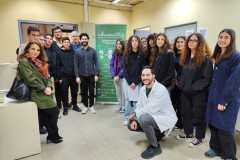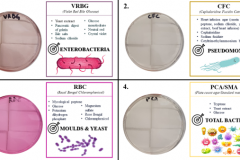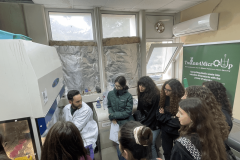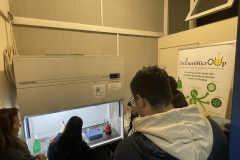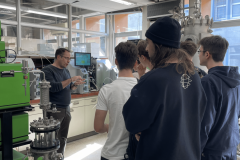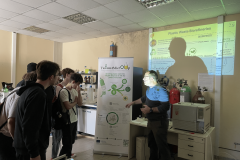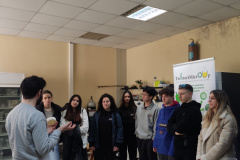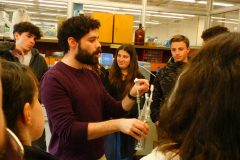School visits / January – April 2025, Greece
![]() As part of the Twinn4MicroUp project’s commitment to public engagement and science education, 219 students from local schools were recently welcomed at the Biotechnology Laboratory. These visits offered young learners an exciting opportunity to explore real-world science in action, with a special focus on the global issue of plastic pollution. During the tours, students were introduced to the environmental impact of single-use plastics and learned how biotechnology—particularly the use of microbes—can offer sustainable alternatives to conventional plastic waste management. Instead of simply discarding or downcycling plastic, they discovered how microbial upcycling can transform waste into valuable bioproducts, feeding into a circular bioeconomy. The students engaged in lively discussions about sustainability, asked thoughtful questions, and left with a deeper understanding of how science can help solve pressing environmental problems. For many, it was their first time in a research lab—an experience that sparked curiosity and inspiration for future scientific exploration.
As part of the Twinn4MicroUp project’s commitment to public engagement and science education, 219 students from local schools were recently welcomed at the Biotechnology Laboratory. These visits offered young learners an exciting opportunity to explore real-world science in action, with a special focus on the global issue of plastic pollution. During the tours, students were introduced to the environmental impact of single-use plastics and learned how biotechnology—particularly the use of microbes—can offer sustainable alternatives to conventional plastic waste management. Instead of simply discarding or downcycling plastic, they discovered how microbial upcycling can transform waste into valuable bioproducts, feeding into a circular bioeconomy. The students engaged in lively discussions about sustainability, asked thoughtful questions, and left with a deeper understanding of how science can help solve pressing environmental problems. For many, it was their first time in a research lab—an experience that sparked curiosity and inspiration for future scientific exploration.
Additionally, to support hands-on science education, we welcomed 17 students from the 2nd year of the Model High School of Agioi Anargyroi, members of the Chemistry/Biology Group. The aim of their visit was to deepen their understanding of plastic pollution and explore green biotechnological solutions. Students received a hands-on training on how to analyze the microbial content of environmental samples in the context of discovering plastic-degrading microorganisms. They engaged in the analysis of microbial load in river water samples by cultivating microorganisms on solid media with different nutrient compositions. This approach allows selective identification of microbial species, providing insights into environmental microbiology and laboratory methodologies. Outreach activities like these play a vital role in fostering environmental awareness and nurturing the next generation of scientists, innovators, and changemakers.
![]()
![]()
Gratitude is extended to all participating schools, teachers, and students for their enthusiasm and involvement. Further updates from the Twinn4MicroUp project will continue to highlight the importance of connecting science and society through impactful educational initiatives.

